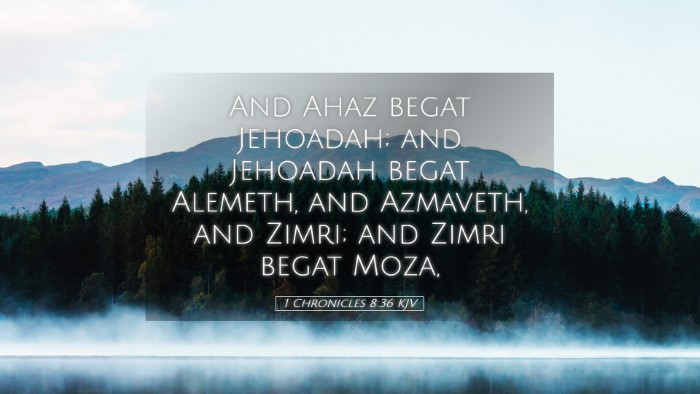Commentary on 1 Chronicles 8:36
1 Chronicles 8:36 presents a unique glimpse into the genealogical record central to the theological narrative of the Old Testament. This passage reads:
“And the sons of Mikloth were, Piresh, and Melech.”
Contextual Overview
This verse appears in a genealogical list that catalogs the descendants of Benjamin, emphasizing the significance of lineage within the Hebrew tradition. It details the family structure and the importance of lineage for tribal identity. Historical contexts are provided by each commentator, grounding the reader in the significance of the family heritage.
Insights from Matthew Henry
Lineage and Identity: Matthew Henry notes that genealogy in Israel was not merely for historical purposes but was deemed an integral aspect of their identity before God. The meticulous recording of names, particularly in the tribes, enshrined their heritage and established solid foundations for their roles within the community.
Spiritual Legacy: Henry emphasizes that the mention of Mikloth's sons enunciates a spiritual legacy of faithfulness that is to be upheld by successive generations. Every name listed signifies a relationship with God that should guide how future generations live.
Lessons for Today: The modern reader is challenged to consider their own spiritual heritage and the responsibilities that come with it. Each name carries the weight of past choices and the call to future fidelity.
Insights from Albert Barnes
Genealogy's Purpose: Albert Barnes offers a detailed explanation of the purpose of genealogies in Scripture. They serve as a reminder of God's faithfulness and His covenant promises to His people. Barnes draws attention to the fact that the names listed are not arbitrary but are part of God's sovereign plan through the history of Israel.
Sons of Mikloth: The reference to the sons of Mikloth is indicative of the extended family and tribal unity, illustrating how each individual is woven into the larger tapestry of divine purpose. Barnes interprets this passage as a call for unity among God's people, urging believers today to reflect on how their lives fit into the broader plan of God's kingdom.
Application for Believers: The contemporary significance lies in recognizing the continuity of faith and the importance of raising our families in the fear and knowledge of the Lord, as demonstrated through the faithful lineage depicted in this text.
Insights from Adam Clarke
Historical Context: Adam Clarke provides a deeper historical context, tracing the familial lines back to the transformative events in Israel's history. He points out that the sons of Mikloth, like many mentioned in the genealogies, played critical roles in the establishment of the tribe of Benjamin and, by extension, were part of God’s unfolding story.
Contributions of the Families: Clarke also emphasizes that these genealogical mentions remind us that every person, whether seemingly significant or not, has a role to play in God’s grand narrative. His commentary elicits a sense of awe regarding how God integrates diverse narratives into His perfect plan.
Personal Reflection: Clarke’s insights encourage readers to reflect on their contributions within the Church today, fostering a sense of responsibility to continue the legacy of faith that we inherit from previous generations.
Theological Implications
This passage invites serious theological reflection on several levels:
- The Sovereignty of God: The detailed genealogies testify to God's sovereignty over history, where every name represents divine purposes.
- Unity and Diversity: While the genealogical lists highlight individual families, they also celebrate the diversity of the community within God's sovereign plan.
- Responsibility of the Believer: The legacy of faith and obedience is passed down through generations, urging contemporary believers to actively participate in the faith narrative.
Conclusion
In summary, 1 Chronicles 8:36 serves as more than a mere historical record; it is a profound call to understand our place within God’s narrative and to uphold the legacy of faith delivered to us through our predecessors. The insights from Matthew Henry, Albert Barnes, and Adam Clarke guide us in recognizing our part in a larger community of believers and instruct us towards living lives that honor the faith that has been passed down through the ages.


